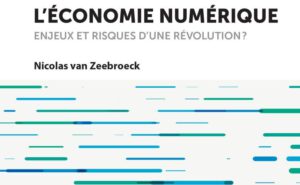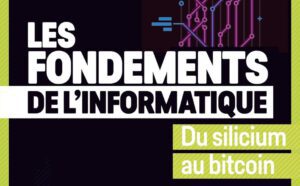- FARI: The Artificial Intelligence for the Common Good Institute in Brussels

About
I am a Professor of Digital Economics and Strategy at the Solvay Brussels School of Economics and Management (SBS-EM) of the Université libre de Bruxelles (ULB). After my master’s in business engineering and doctorate in economics and management at Solvay, I worked as a postdoctoral researcher at the FNRS (from 2009 to 2011), visiting the Georgia Institute of Technology in Atlanta in 2009.
My research, which has appeared in journals such as Management Science, Research Policy, Harvard Business Review, MIT Sloan Management Review, Technovation, Information Economics and Policy, and Pattern Recognition, focuses on the ways in which digital technology affects the performance and organisation of companies and industries.
At Solvay, I teach computer science, management information systems, digital strategy, and digital transformation. In recent years, I have taken a particular interest in artificial intelligence and the contribution (positive and negative) of digital technology to environmental challenges.
I regularly appear as an expert on these same themes in the media, for private or public institutions or at professional or general public conferences. As Deputy to the President and Rector of the University since 2019, I am responsible for ULB’s IT and digital strategy. I have served as a member of Belgium’s High Council for Employment from 2020 to 2025 and as a Senior Fellow at the Conference Board.
I am currently director of TIMES² (SBS-EM’s research center on innovation, technology, and strategy) and a founding member of FARI (the ULB-VUB Institute on Artificial Intelligence for the Common Good).
My professional journey started as a consultant at Capgemini, before coming back to Solvay for my PhD in Economics and Management . Since I joined Solvay as a Professor in 2011, I have been academic director of its Master’s in Business Engineering (from 2011 to 2016) and its Advanced Master in Innovation and Strategic Management (from 2014 to 2016). I have successfully led the EQUIS re-accreditation process of the School in 2013 and 2016, and served as Deputy Dean for Management Research from 2018 to 2020.
Digital business
- Digital business models
- Digital strategy & transformation
- Artificial intelligence strategy
- Digitalization & sustainability
Economics of digitization
- ICT, digital and AI adoption
- Contribution of ICT to productivity
- Impact of ICT, digital & AI on firm organization, capabilities and skills
- Business value of ICT, digital & AI
Innovation management
- Knowledge management and spillovers
- Innovation and IP management
Courses taught

A survival guide in the digital jungle
“L’Économie numérique: enjeux et ressorts d’une révolution” published by Éditions de l’ULB
Digital technology is everywhere, but it’s not neutral.
While it promised to break down barriers and democratize the planet, it has spawned an economy that favors the most powerful and defies regulation. How can we understand the stakes and driving forces behind this revolution? How can we face up to it and take advantage of it?
This book is a survival guide to the digital jungle, deciphering the mechanisms and players that shape it, and the failure of attempts to regulate it. It provides the keys to action and innovation in this changing world.
Entrepreneur or business leader
This book will give you the keys to understanding the particular nature of digital business models and how to exploit these particularities.
A student of economics or management
You’ll find in this book a simple and comprehensive explanation of the main research themes in digital economics, and a summary of the main research trends in the field of the digital economy, platforms and networks.
Citizen or the curious
This is the book you need to understand the mechanisms of the digital economy, the reasons why technology tends to concentrate value, and the extreme difficulty of regulating it.
Journalist
This book is a gold mine for getting back to the fundamental principles governing the digital economy, and what’s behind the news of digital companies and their regulation.

A global vision of IT
“Les fondements de l’informatique: du silicium au bitcoin” published by Éditions De Boeck Supérieur
An intermediate step between longer, more in-depth works and simple user or troubleshooting manuals, this manual enables students to:
- Give meaning to widely-used but often misunderstood terms (RAM, IP address, graphics card, etc.),
- Understand the operating principles of computers and mobile devices (architecture, peripherals, software, networks)
- Master information processing (XML, relational databases, programming languages).
It takes into account the many recent developments in the field: mobile devices (Android, iOS), the Internet of Things, new man-machine interfaces, virtual and augmented reality, Blockchain, Metavers, Cloud Computing and Big Data, etc…
It also offers a critical, cross-disciplinary look at :
- Industrial and environmental IT issues,
- IT security (encryption and security of data and systems, cyber-attacks, etc.),
- Current technological developments (quantum computing, code-free development, artificial intelligence, etc.).
Digital resources (applications) complete the package: Introduction to databases, SQL, object-oriented programming and enterprise computing.
Higher education student
You will find in this book a clear and complete explanation of the main concepts underlying modern computing, from the processor to networks, including the basics of Python programming.
Citizen or curious
This is the book you need to understand how your computer, tablet or smartphone works and discover what is really hidden behind the technical jargon.
Publications
Selected publications
Contributions to conference proceedings and collective works
Papers in submission / revision process
